Are V8 Energy Drinks Healthy? The Real Facts on Sugar, Caffeine, and Ingredients
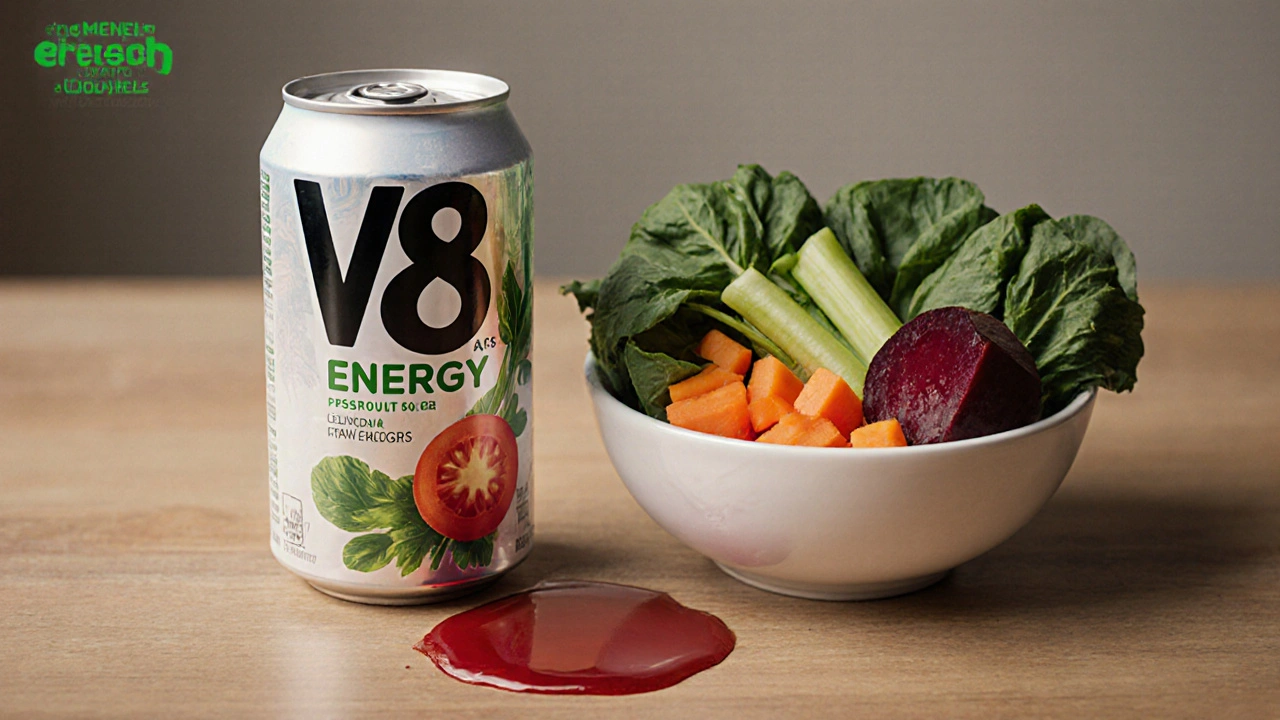
Let’s cut to the chase: V8 Energy drinks aren’t healthy. Not because they’re poison, but because they’re marketed like a health product when they’re really just another sugary, caffeinated soda with a vegetable-flavored twist. If you’re drinking V8 Energy thinking you’re getting a nutritious boost, you’re being misled.
What’s actually in V8 Energy drinks?
V8 Energy comes in two main versions: the original 12-ounce can and the low-sugar variant. The original has 80 milligrams of caffeine - about the same as a cup of brewed coffee - and 10 grams of sugar. That’s not a lot compared to a 16-ounce Monster or Red Bull, but it’s still a full 2.5 teaspoons of added sugar in a drink that claims to be "vegetable-based."
The low-sugar version swaps cane sugar for sucralose and acesulfame potassium. That cuts the sugar to 1 gram, but you’re still getting artificial sweeteners. And while those sweeteners are FDA-approved, long-term studies on their impact on gut health and insulin response are still inconclusive. The World Health Organization flagged them in 2023 as something to limit, especially if you’re trying to manage weight or blood sugar.
Then there’s the "vegetable juice" part. V8 Energy contains 20% vegetable juice blend - tomato, carrot, celery, beet, spinach. Sounds healthy, right? But here’s the catch: you’d need to drink three cans to get the same amount of fiber and nutrients as one serving of actual vegetables. The rest? Water, citric acid, natural flavors, and preservatives. It’s not a substitute for eating veggies. It’s a flavored drink with a tiny splash of juice.
How does V8 Energy compare to other energy drinks?
Compared to Monster or Rockstar, V8 Energy looks better on paper. Less sugar. Less caffeine. No taurine or guarana. But compared to real alternatives - like black coffee, green tea, or even sparkling water with a splash of lime - it’s still a processed product with additives you don’t need.
Here’s a quick breakdown:
| Drink | Caffeine (mg) | Sugar (g) | Artificial Sweeteners | Vegetable Juice Content |
|---|---|---|---|---|
| V8 Energy (Original) | 80 | 10 | No | 20% |
| V8 Energy (Low Sugar) | 80 | 1 | Yes (sucralose, acesulfame K) | 20% |
| Red Bull (12 oz) | 111 | 27 | No | 0% |
| Monster Energy | 160 | 54 | No | 0% |
| Black Coffee (12 oz) | 120 | 0 | No | 0% |
So yes, V8 Energy has less sugar than most. But it’s still not a health drink. It’s a compromise - better than Monster, worse than water.
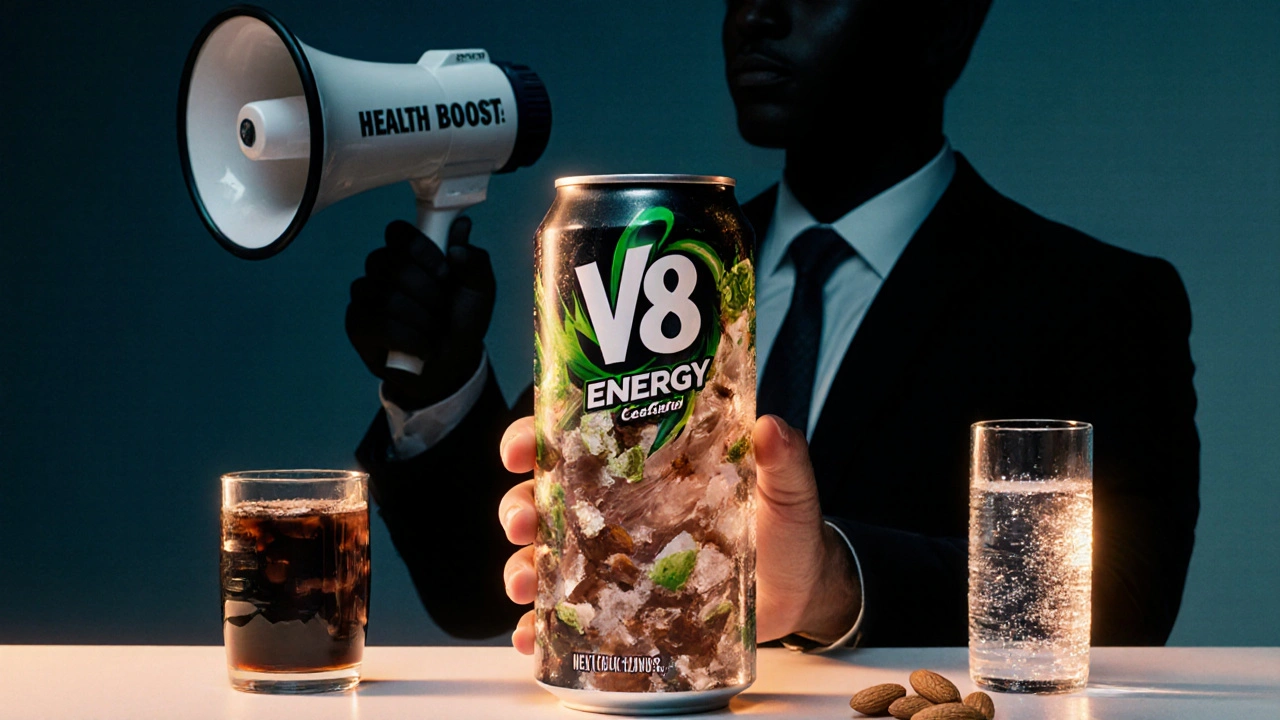
Who should avoid V8 Energy?
If you’re pregnant, have high blood pressure, or are sensitive to caffeine, skip it. Even 80 mg can trigger jitters, heart palpitations, or sleep issues in some people. The American Heart Association recommends no more than 400 mg of caffeine per day for healthy adults - that’s five cans of V8 Energy. But most people don’t stop at one.
Teens and kids? Don’t give it to them. The American Academy of Pediatrics says energy drinks have no place in children’s diets. Even the "low-sugar" version contains stimulants that can disrupt developing nervous systems.
And if you’re trying to lose weight or manage type 2 diabetes, the sugar in the original version is a red flag. The low-sugar version might seem safer, but artificial sweeteners can still trigger cravings and insulin spikes in some people. A 2022 study in the Journal of Clinical Endocrinology & Metabolism found that daily consumption of artificially sweetened drinks was linked to higher belly fat over time - even without weight gain.
Why do people think V8 Energy is healthy?
Because of the branding. The name "V8" comes from the original vegetable juice product - a real, unsweetened drink with no caffeine, no sugar, and actual nutrients. That brand carries trust. When they launched V8 Energy, they leaned hard into that reputation. The green label, the vegetable imagery, the word "energy" instead of "caffeine" - it’s all designed to make you feel like you’re doing something good.
It’s not. It’s marketing.
Real health doesn’t come from a can. It comes from sleep, hydration, balanced meals, and movement. If you need a pick-me-up, try a 10-minute walk, a glass of water, or a handful of almonds. You’ll feel better for longer - and without the crash.
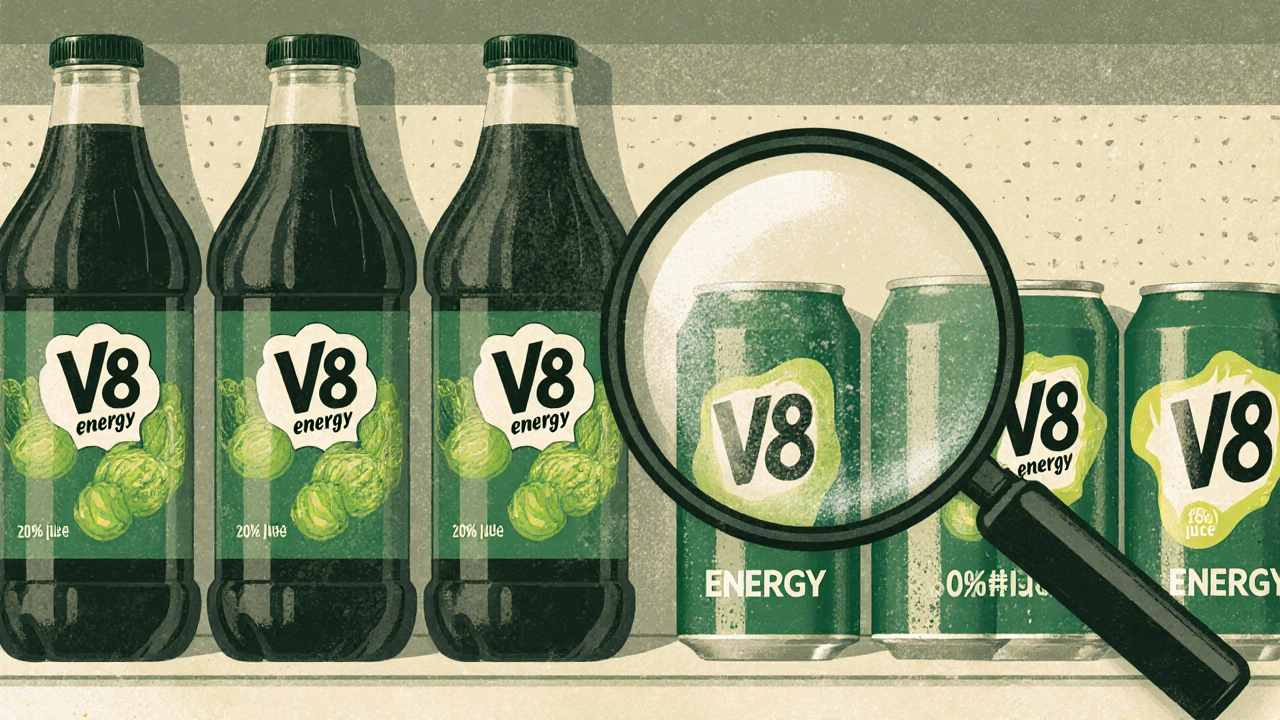
What are better alternatives?
If you’re looking for a real energy boost without the junk, here’s what works:
- Black coffee or green tea - natural caffeine, zero sugar, antioxidants.
- Sparkling water with lemon or lime - hydrating, refreshing, no additives.
- Electrolyte tablets in water - great after workouts, no sugar or stimulants.
- Matcha latte - smooth, sustained energy from L-theanine and caffeine.
- Homemade vegetable juice - blend celery, cucumber, spinach, and apple. No preservatives, no sugar added.
These options don’t come in colorful cans with "energy" stamped on them. But they actually support your body - not just your alertness.
Bottom line: Is V8 Energy healthy?
No. It’s not unhealthy in the way a soda full of high-fructose corn syrup is. But calling it "healthy" is misleading. It’s a low-sugar, low-caffeine energy drink with a vegetable-flavored gimmick. If you’re drinking it because you think it’s good for you, you’re being sold a fantasy.
It’s fine as an occasional treat - maybe once a week if you’re tired and out of coffee. But if you’re drinking it daily because you believe it’s a health choice, you’re better off switching to something real.
Real food. Real water. Real rest. That’s the only energy drink your body actually needs.
Is V8 Energy drink good for weight loss?
No. While the low-sugar version has only 1 gram of sugar, artificial sweeteners can still trigger hunger signals and cravings in some people. Studies show that regular consumption of artificially sweetened drinks is linked to increased abdominal fat, even without weight gain. For weight loss, stick to water, black coffee, or unsweetened tea.
Does V8 Energy have real vegetables?
Yes - but barely. Each can contains 20% vegetable juice blend (tomato, carrot, beet, spinach, celery). That’s about 2 tablespoons of juice per 12 oz can. You’d need to drink three cans to get the nutrients from one serving of actual vegetables. The rest is water, flavorings, and preservatives.
Can kids drink V8 Energy?
No. The American Academy of Pediatrics strongly advises against energy drinks for children and teens. Even low-caffeine versions can disrupt sleep, increase anxiety, and affect heart rhythm in developing bodies. V8 Energy is not a healthy alternative - it’s still an energy drink.
Is V8 Energy better than Red Bull?
Yes, in some ways. V8 Energy has less sugar (10g vs. 27g) and less caffeine (80mg vs. 111mg). It also contains a small amount of vegetable juice. But it still contains artificial ingredients and stimulants. Neither is healthy. If you’re choosing between them, V8 Energy is the lesser of two processed options - but neither should be a daily habit.
How much V8 Energy is safe to drink per day?
One can per day is likely fine for healthy adults. Two cans may push you close to the recommended caffeine limit (400mg/day), especially if you drink coffee or tea too. More than that increases risk of jitteriness, insomnia, or heart palpitations. The low-sugar version reduces sugar intake but doesn’t eliminate risks from artificial sweeteners or caffeine sensitivity.

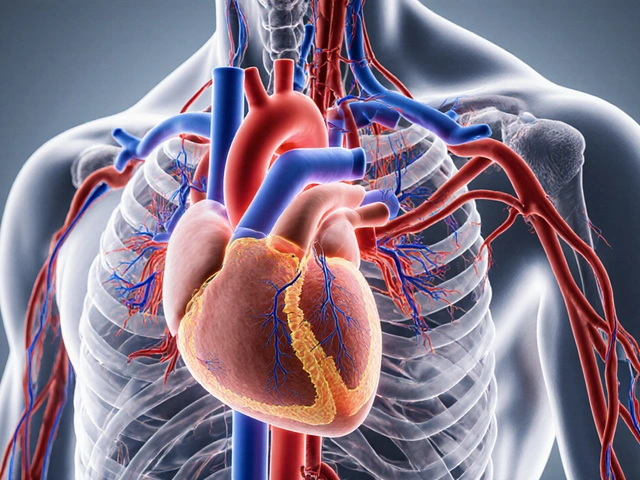
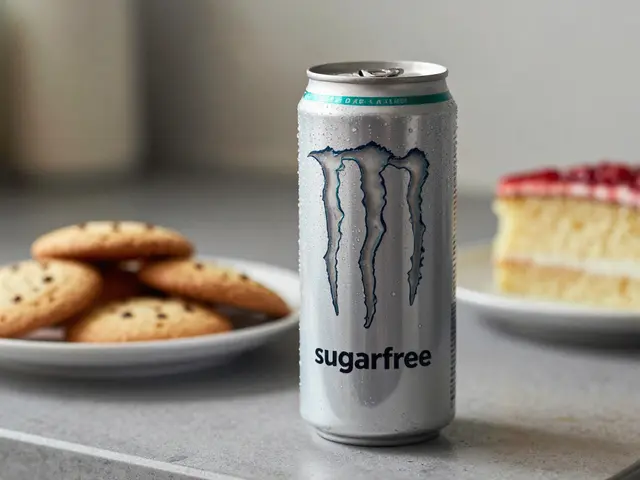
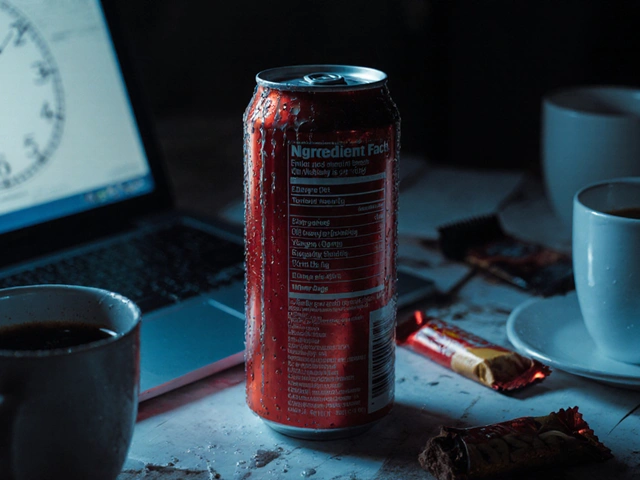
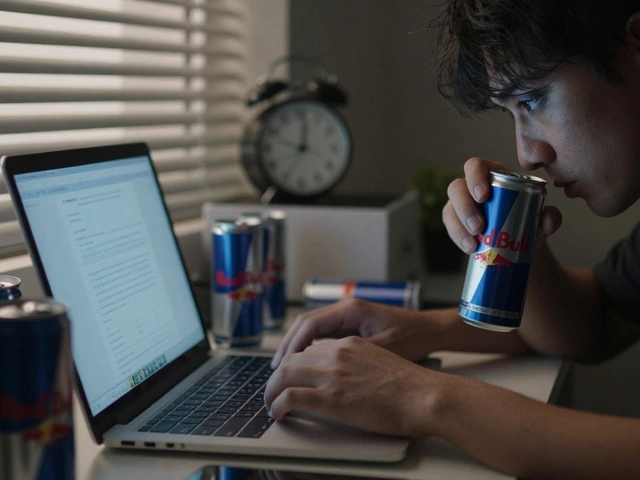
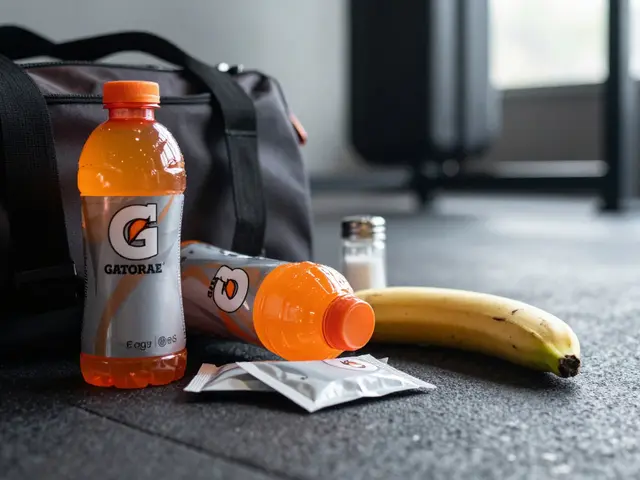
Comments (10)
mark nine
12 Nov 2025
Just drank one yesterday. Tasted like vegetable soup that got into a fight with a Red Bull. Still better than my ex.
Xavier Lévesque
13 Nov 2025
They market this like it’s a salad in a can. I get it - you want to feel like you’re doing something healthy while chugging sugar water. But no. You’re not fooling your liver. Or your dentist. Or your inner child who still thinks ‘vegetable’ means ‘fun.’
It’s not poison. It’s just a very expensive placebo with a green label.
Scott Perlman
13 Nov 2025
Just drink water. Or tea. Or sleep. It works better and costs less.
Sandi Johnson
15 Nov 2025
So V8 Energy is the vegan’s version of Monster? The one you buy when you’re trying to be good but still want to feel like a demon in a can?
I get it. I’ve been there. I’ve had the ‘I’m eating kale so I deserve this’ moment. Then I looked at the label. And cried a little.
Eva Monhaut
16 Nov 2025
The real tragedy isn’t the artificial sweeteners or the 20% vegetable juice - it’s that we’ve been trained to believe that ‘energy’ must come in a can, with a flashy label and a promise of transformation.
My grandmother brewed chamomile tea in a chipped mug and still outlived three generations of energy drink enthusiasts. She didn’t need a label to tell her she was ‘healthy.’ She just lived.
Maybe the real energy drink is silence. Or a walk. Or a nap without guilt.
Rakesh Kumar
17 Nov 2025
Bro in India we have chai with ginger and cardamom - no sugar, no caffeine overload, just warmth and soul. You think you need a can to wake up? Try waking up with your senses instead.
My aunty makes a drink with amla, mint, and lemon - zero additives, 100% life. V8 Energy? That’s a marketing illusion wrapped in a plastic can.
Tony Smith
18 Nov 2025
While I appreciate the pragmatic tone of this analysis, one must not overlook the sociological implications of corporate rebranding. The V8 franchise has successfully leveraged decades of consumer trust in wholesome nutrition to sell a stimulant-laced beverage under the guise of health.
This is not merely a product issue - it is a cultural failure of nutritional literacy.
Buddy Faith
18 Nov 2025
the whole thing is a lie the vegetable juice is just a trick so you feel better about drinking something that makes your heart race like a racecar on espresso
they dont even use real veggies just the flavor extract from a lab somewhere in new jersey
and the low sugar version? its worse because now your brain thinks its healthy so you drink three
and the FDA? they approved it because they dont have enough coffee
Thabo mangena
20 Nov 2025
In South Africa, we have rooibos tea - naturally caffeine-free, rich in antioxidants, and served hot or cold. No cans. No labels. No illusions.
It is not marketed as ‘energy.’ It simply nourishes. And in that simplicity, it is more powerful than any beverage bearing the word ‘energy’ on its label.
Let us not confuse stimulation with vitality.
Karl Fisher
20 Nov 2025
Okay but have you considered that V8 Energy is just the *art* of capitalism? Like, imagine if this drink was a painting in a museum - the title would be ‘The Illusion of Health in the Age of Consumer Delusion.’
The vegetable juice? It’s not even a garnish. It’s a prop. The label? Performance art. The consumer? The unwitting protagonist in a tragicomedy written by a marketing team that studied Nietzsche and then sold out to Pepsi.
I don’t drink it. I *curate* it. As a statement.
Also, I own three cans. They’re framed. On my wall. Next to the Tesla logo.